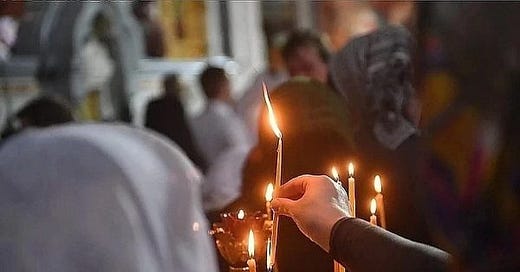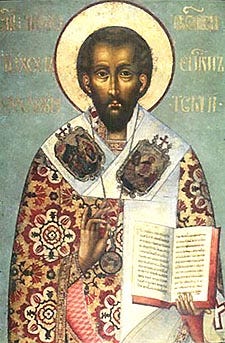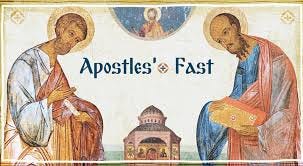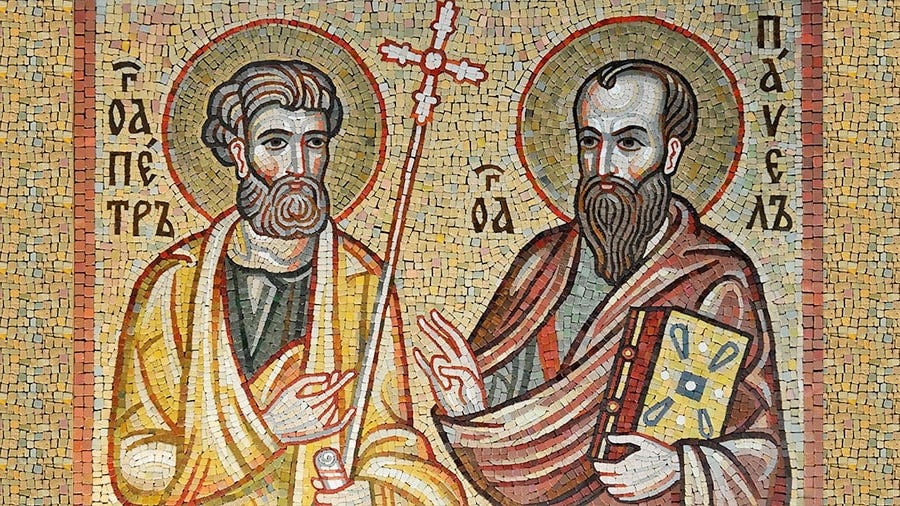Always keep in mind that it is not enough merely to desire what is pleasing to God; one must serve Him with a pure heart and without any desire to please oneself. To succeed in this, one must endure a fiercer struggle against one’s own nature than any faced before.
For our nature is so inclined toward self-love that even in the best and most spiritual deeds, it seeks subtly and lustfully to satisfy itself and to be secretly nourished by them.
+ St. Nikodemos the Hagiorite
Romans 2:28-3:18 (Epistle)
28 For he is not a Jew who is one outwardly, nor is circumcision that which is outward in the flesh;
29 but he is a Jew who is one inwardly; and circumcision is that of the heart, in the Spirit, not in the letter; whose praise is not from men but from God.
1 What advantage then has the Jew, or what is the profit of circumcision?
2 Much in every way! Chiefly because to them were committed the oracles of God.
3 For what if some did not believe? Will their unbelief make the faithfulness of God without effect?
4 Certainly not! Indeed, let God be true but every man a liar. As it is written: “That You may be justified in Your words, and may overcome when You are judged.”
5 But if our unrighteousness demonstrates the righteousness of God, what shall we say? Is God unjust who inflicts wrath? (I speak as a man.)
6 Certainly not! For then how will God judge the world?
7 For if the truth of God has increased through my lie to His glory, why am I also still judged as a sinner?
8 And why not say, “Let us do evil that good may come”? – as we are slanderously reported and as some affirm that we say. Their condemnation is just.
9 What then? Are we better than they? Not at all. For we have previously charged both Jews and Greeks that they are all under sin.
10 As it is written: “There is none righteous, no, not one;
11 there is none who understands; there is none who seeks after God.
12 They have all turned aside; they have together become unprofitable; there is none who does good, no, not one.”
13 “Their throat is an open tomb; with their tongues they have practiced deceit; the poison of asps is under their lips;
14 whose mouth is full of cursing and bitterness.”
15 “Their feet are swift to shed blood;
16 destruction and misery are in their ways;
17 and the way of peace they have not known.”
18 There is no fear of God before their eyes.
Matthew 6:31-34, 7:9-11 (Gospel)
31 Therefore do not worry, saying, ‘What shall we eat?’ or ‘What shall we drink?’ or ‘What shall we wear?’
32 For after all these things the Gentiles seek. For your heavenly Father knows that you need all these things.
33 But seek first the kingdom of God and His righteousness, and all these things shall be added to you.
34 Therefore do not worry about tomorrow, for tomorrow will worry about its own things. Sufficient for the day is its own trouble.
9 Or what man is there among you who, if his son asks for bread, will give him a stone?
10 Or if he asks for a fish, will he give him a serpent?
11 If you then, being evil, know how to give good gifts to your children, how much more will your Father who is in heaven give good things to those who ask Him!
St. Tychon (Tikhon, Tycho), Bishop of Amathus in Cyprus (4th-5th c.)
Saint Tikhon, Bishop of Amathus, was born in the city Amathus on the island of Cyprus. His parents raised their son in Christian piety, and taught him the reading of sacred books. It is said that the gift of wonderworking appeared in Saint Tikhon at quite a young age.
His father was the owner of a bakery, and whenever he left his son alone in the shop, the holy youth would give free bread to those in need. Learning of this, his father became angry, but the son said that he had read in the Scriptures, that in giving to God one receives back a hundredfold. “I,” said the youth, “gave to God the bread which was taken,” and he persuaded his father to go to the place where the grain was stored. With astonishment the father saw that the granary, which formerly was empty, was now filled to overflowing with wheat. From that time the father did not hinder his son from distributing bread to the poor.
A certain gardener brought the dried prunings of vines from the vineyard. Saint Tikhon gathered them, planted them in his garden and besought the Lord that these branches might take root and yield fruit for the health of people. The Lord did so through the faith of the holy youth. The branches took root, and their fruit had a particular and very pleasant taste. It was used during the lifetime of the saint and after his death for making wine for the Mystery of the Holy Eucharist.
They accepted the pious youth into the church clergy, made him a reader. Later, Mnemonios, the Bishop of Amathus ordained him a deacon. After the death of Bishop Mnemonios, Saint Tikhon by universal agreement was chosen as Bishop of Amathus. Saint Epiphanius, Bishop of Cyprus (May 12), presided at the service.
Saint Tikhon labored zealously to eradicate the remnants of paganism on Cyprus; he destroyed a pagan temple and spread the Christian Faith. The holy bishop was generous, his doors were open to all, and he listened to and lovingly fulfilled the request of each person who came to him. Fearing neither threats nor tortures, he firmly and fearlessly confessed his faith before pagans.
In the service to Saint Tikhon it is stated that he foresaw the time of his death, which occurred in the year 425.
The name of Saint Tikhon of Amathus was greatly honored in Russia. Temples dedicated to the saint were constructed at Moscow, at Nizhni Novgorod, at Kazan and other cities. But he was particularly venerated in the Voronezh diocese, where there were three archpastors in succession sharing the name with the holy hierarch of Amathus: Saint Tikhon I (Sokolov) (+ 1783, August 13), Tikhon II (Yakubovsky, until 1785) and Tikhon III (Malinin, until 1788).
The Apostles’ Fast
Many non-Orthodox Christians often wonder what is the Apostles Fast in the Orthodox Church. It is often seen as a hidden treasure of the Liturgical Calendar - everyone knows about the Great Lent and even the Nativity Fast, but the rather short Apostles Fast often gets forgotten.
Jesus Christ Himself set the foundation for fasting. As it is said in the New Testament:
“Can you make the guests of the bridegroom fast while He is with them? But the time will come when the bridegroom will be taken from them; then they will fast.” (Luke 5:35)
The roots of the Apostles Fast go back to the first century of Christianity. After the Lord’s Ascension, His disciples lived a lifestyle of continuous fasting and prayer until the day the Holy Spirit descended - the day of Pentecost.
After Pentecost, the Apostles also fasted, but this time the reason was a little bit different. It was the fast of thanksgiving for the gifts of the Holy Spirit that they received. Another reason was to get well prepared for their mission of preaching and spreading the Gospel throughout the world.
The Fast is not only present in the Eastern Orthodox Church. It is also observed by the Coptic Orthodox Church and Eastern Catholics.
When does the Apostles Fast start and end in 2025?
Here is an interesting fact about the Fast: it doesn’t have a set date and its length varies from year to year. How is that possible? Well, let’s look a bit deeper into the history of the Fast.
The Orthodox Apostles Fast was officially established during the Ecumenical Council of Nicea in 325 AD. It was decided that the Fast must start on the second Monday after the Feast of Pentecost (or the next day after the Feast of All Saints) and lasts right until the day when we commemorate the martyrdom of the Apostles Peter and Paul. This is why it is often called the Peter and Paul Fast.
In 2025 the Peter and Paul Fast starts on June 16th and ends on July 11th in the Belarussian Orthodox Church.
How long is the Apostles Fast?
Each year the Fast starts and ends on different dates and even in different months. This means that its length is not set, but determined by the day of the Ressurection or simply Pascha. For example, in 2022 the Apostles Fast lasted for three weeks.
In general, the Holy Apostles Fast may last from 8 to 49 days, depending on the year.
What are the rules of the Apostles Fast?
The Fast is nowhere near as strict as the Great Lent. However, there is a list of products that are prohibited for Christians to consume during the Fast:
red meat;
poultry;
eggs;
dairy.
Such products as oil, fish and wine are prohibited on Wednesdays and Fridays of the Apostles Fast.
When it comes to the church services of the Fast, it is a tradition in the Russian and Belorussian Orthodox Church to serve the Lenten services on the first day or even the first week of the Fast. Such services help the faithful to prepare mentally and spiritually for the journey ahead.
What is the significance of the Apostles Fast?
Just as Christ fasted 40 days after the Holy Spirit descended upon Him like a dove, the Apostles also fasted after the day of Pentecost. As we know, the Holy Spirit is now upon us as well. So it makes sense for us to fast the Fast of thanksgiving to God.
With the Apostles Fast, we meditate on the Glory of God and worship the Holy Trinity - the Father, the Son and the Holy Spirit. The Fast is also a great instrument for any Christian to get closer to God and grow spiritually.
This week’s calendar reminders:
Monday 6/16: Matins 8:30 a.m.; Stewards Meeting 6:30 p.m.; Apostles Fast Begins
Tuesday 6/17: no services or events
Wednesday 6/18: no services or events
Thursday 6/19: Matins 8:30 a.m.; FORCC Meeting at CTS 6:30 p.m.
Friday 6/20: Matins 8:30 a.m.
Saturday 6/21: Catechumen Class 4:30 p.m.; Choir Practice 5 p.m.; Great Vespers 6 p.m.
Sunday 6/22: Hours & Divine Liturgy 9:15 a.m.
CLICK BELOW to donate online:
Christ the Savior Orthodox Church is located in Southbury, Connecticut, and is part of the New England Diocese of the Orthodox Church of America.
Mailing address: Christ the Savior Church, 1070 Roxbury Road, Southbury, CT 06488
PLEASE DONATE to help our parish do the work of the Lord, thrive and grow, and extend the Kingdom of God. May the Lord bless your generosity!
Fr. Moses Locke can be reached at frmoseslocke@gmail.com












